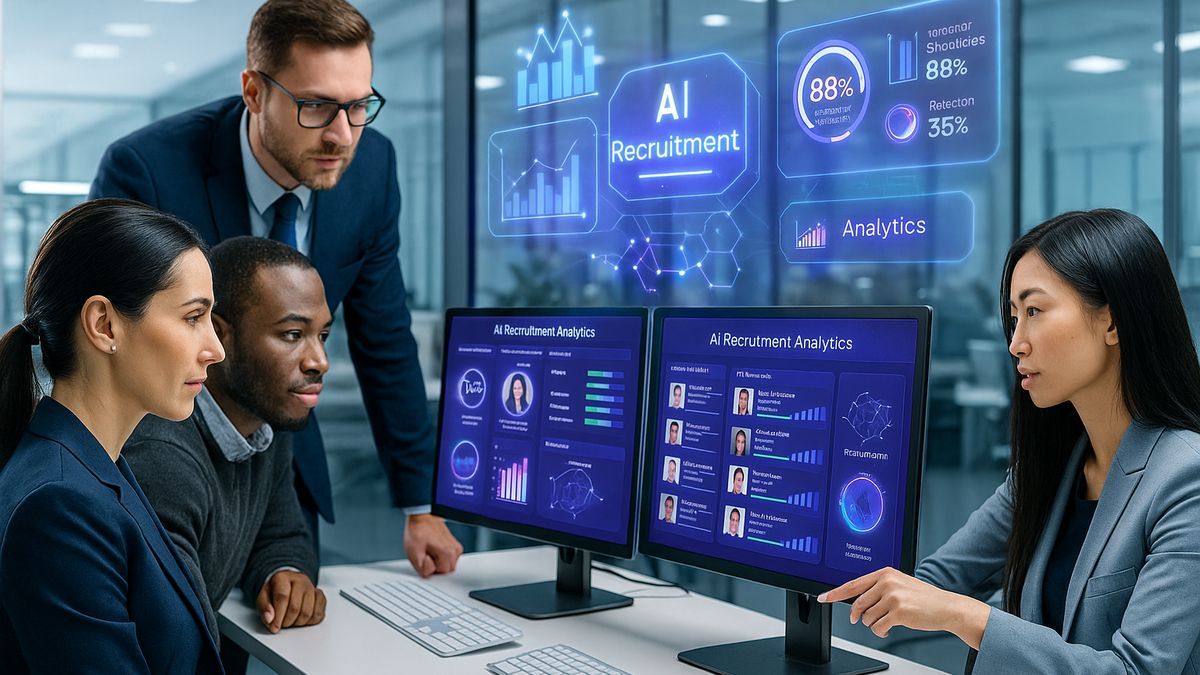Discover how AI transforms recruitment through automation, efficiency, and enhanced hiring processes. This article provides expert insights on how AI-powered tools are revolutionising talent acquisition. This article discusses how AI transforms recruitment across global markets. The recruiting industry is experiencing an unprecedented revolution as AI transforms recruitment fundamentally, reshaping how organisations attract, assess, and hire talent. This technological shift is not merely an upgrade. It’s a complete reimagining of traditional hiring methodologies.
AI is significantly transforming the recruitment landscape by automating tasks, improving efficiency, and enhancing the overall hiring process. AI-powered tools can streamline tasks like resume screening, candidate sourcing, and interview scheduling, allowing recruiters to focus on more strategic and human-centric aspects of hiring, such as cultural fit and relationship building. Recruitment how ai is transforming recruitment
The Current State: How AI Transforms Recruitment Today
Modern recruitment faces unprecedented challenges: skills shortages, remote work complexities, and the need for faster hiring cycles. This is where AI transforms recruitment by providing intelligent solutions that address these pain points systematically.
Today’s AI-powered recruitment tools process thousands of applications in minutes, identify passive candidates across multiple platforms, and predict candidate success with remarkable accuracy. Companies implementing these technologies report a 75% reduction in screening time and a 40% improvement in hiring quality. AI is reshaping recruitment
Key Areas Where AI Transforms Recruitment
1. Automated Resume Screening. Traditional resume screening consumes 60% of recruiters’ time. Now, AI algorithms analyse resumes against job requirements, scoring candidates based on skills, experience, and potential fits. This automation allows human recruiters to focus on high-value activities like candidate engagement and strategic planning.
2. Intelligent Candidate Sourcing AI-powered sourcing tools go beyond traditional job boards by analysing professionals’ networks, social media profiles, and industry publications to identify potential candidates. These tools use natural language processing to understand job requirements and match them with candidate profiles across the internet.
3. Enhanced Interview Processes Video interview platforms now incorporate AI to analyse facial expressions, speech patterns, and respondents’ qualities. While controversial, these tools provide objective data points that complement human judgement in candidate assessment.
Regional Impact: How AI Transforms Recruitment in MENA Markets
The Middle East and North Africa region presents unique recruitment challenges that AI addresses effectively. AI transforms recruitment in MENA by handling bilingual processing, understanding cultural nuances, and managing complex visa requirements.
For instance, in Qatar’s oil and gas sector, AI systems now match candidates not just on technical skills but also on cultural adaptation potential and family status considerations. Similarly, the UAE’s diverse business environment benefits from AI’s ability to process applications in multiple languages while maintaining consistency in evaluation criteria. AI in talent acquisition
Industry-Specific Applications
Oil & Gas Sector: AI algorithms assess technical certifications, safety records, and project experience while predicting candidate success in offshore environments. The technology considers factors like rotation preferences, family constraints, and career progression patterns.
Banking & Finance: In Islamic banking, AI systems understand Sharia compliance requirements and match candidates with appropriate experience in Islamic financial instruments. The technology also processes regulatory certifications and risk management qualifications effectively.
The Technology Behind the Transformation
Understanding how AI transforms recruitment requires examining the underlying technologies. Machine learning algorithms analyse historical hiring data to identify patterns for successful placements. Natural language processing enables systems to understand job descriptions and candidate profiles in context rather than just keywords.
Predictive analytics forecast candidate performance, retention likelihood, and cultural fit probability. These insights help recruiters make data-driven decisions while reducing unconscious bias in the hiring process.
Real-World Implementation Examples
A major UAE construction company implemented AI-powered recruitment and reduced its hiring cycle from 8 weeks to 3 weeks while improving candidate quality scores by 35%. The system automatically screened 2,000+ applications for a mega-project, identifying the top 50 candidates for human review.
Similarly, a Qatar-based technology firm used AI to build its development team, sourcing candidates from 15 countries and achieving a 95% offer acceptance rate through predictive matching algorithms.
Benefits and Challenges of AI-Powered Recruitment
Key Benefits:
- Speed: 75% faster initial screening processes
- Accuracy: Reduced mis-hires by 40% through better matching
- Scale: Ability to process thousands of applications simultaneously
- Consistency: Standardised evaluation criteria across all candidates
- Cost-Effectiveness: 60% reduction in cost-per-hire
Challenges to Address:
- Data privacy and GDPR compliance requirements
- Potential algorithmic bias in AI systems
- Need for human oversight in final decisions
- Initial investment and training requirements
- Candidate experience considerations
Future Outlook: The Continued Evolution
As AI changes recruitment, new trends are appearing, such as using conversational AI to talk to candidates at the start, sentiment analysis to see if they fit the company culture, and blockchain to check their These developments will create even more sophisticated and efficient hiring processes.
The future of recruitment technology lies in the integration of AI with virtual reality for immersive job previews and augmented reality for skills assessment. Organisations that prepare for these developments will maintain their competitive advantages in talent acquisition.
Strategic Implementation for Maximum Impact
Successful implementation requires a phased approach: start with high-impact, low-risk applications like resume screening, then gradually expand to more complex functions like predictive analytics and candidate matching.
Organisations should invest in training their recruitment teams to work effectively with AI tools, ensuring human judgement remains central to final hiring decisions while leveraging AI’s analytical capabilities.
The evidence is clear: AI transforms recruitment from a traditionally manual, time-intensive process into a strategic, data-driven function that delivers superior outcomes for both employers and candidates. Organisations that embrace this transformation position themselves for sustained success in a competitive talent market.


